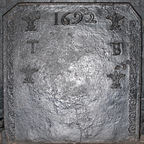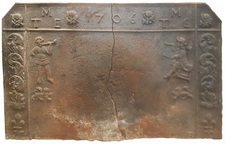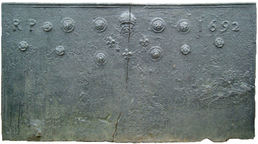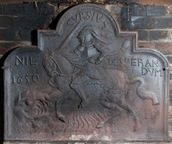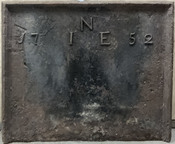-
237
Description: Canted rectangle; twisted rope edging (top and sides); repeated scroll strip stamp along each side; date, top centre, between two fleurs de lys; initial below each fleur, with a fleur below each initial.
Notes: A damaged variant (see Fireback no. 235), probably with six fleurs, no initials, dated 1694, is also known. Formerly at Great House, Llanllowell, Monmouthshire.
Inscription: 1692 / T B
- Decoration tags:
- rectangular with canted top corners (shape)
- rope (edging)
- simple stamps
- carved stamps
- individual letters
- individual numbers
- text
Manufactured: in 1692 possibly in the South Wales area of Wales.
Current location: St Fagans Castle, St Fagans, Glamorgan, Wales.
Museum number: 42.82 (part of the Welsh National History Museum museum group)
- Attached to series:
- St Fagans series
-
276
Description: Arched rectangular shape; cavetto moulding all round; spreading oak tree, with leaves and acorns, filling the whole plate; three royal crowns, one at the top of the tree, the other two symmetrically on the ends of branches towards the top corners; initials GR towards the bottom corners, the remaining inscription on a scroll across the base.
Notes: The design is derived from the celebrated occasion when Charles II evaded his pursuers by hiding in an oak tree at Boscobel House, near Wolverhampton, following the final Royalist defeat at the battle of Worcester in 1651. This popular fireback has been copied frequently, and in this recast example the inscription has been re-modelled, with the traditional CR (for Carolus Rex) replaced by GR (for Georgius Rex - George V). Copies of this fireback were advertised in Bratt Colbran Ltd.'s (London) catalogue in the early-20th century.
Inscription: G THE ROYALL OAK R
- Decoration tags:
- rectangular with round arch (shape)
- cavetto (edging)
- whole carved pattern
- pictorial
- royal
- text
- plants
Manufactured: in the early-20th century in England.
Current location: Chequers, Ellesborough, Buckinghamshire, England.
- Attached to series:
- Commemorative firebacks
-
141
Description: Arched rectangular shape; ovolo moulded edging; central oval shield of the arms of Penkhurst with fillet edge; date arranged in four corners.
Notes: The arms of Penkhurst: Argent, a fess ermines between six mullets sable. Probably the arms of Ferdinando Penkhurst, of Buxted Park, Sussex, who died in 1708. Formerly part of the Ade Collection (from Grove Hill, Hellingly, Sussex).
Inscription: 1707
Arms: Penkhurst, of Mayfield
- Decoration tags:
- rectangular with round arch (shape)
- ovolo (edging)
- whole carved pattern
- individual numbers
- armorial
- text
Manufactured: in 1707 in the Weald area of England.
Current location: Hastings Museum and Art Gallery, John's Place, Bohemia Road, Hastings, East Sussex, England.
Museum number: HASMG: 1952.51.46 (part of the Hastings Museum museum group)
Citation: Dalton, A., 2002, 'The Penkhurst family of ironmasters', Wealden Iron, 2nd ser., 22, pp. 23-26.
Citation: Lloyd, N., 1925, 'Domestic Ironwork I', Architectural Review, 58, pp. 58-67.
- Attached to series:
- Personal armorial firebacks
-
841
Description: Canted rectangle; cavetto-moulded edging (top and sides); single horizontal fillet below canted corners and vertical fillet parallel to each side, dividing the fireback into two side panels, two top corner panels, top panel and main central panel; corner panels, ‘daisy’ plant stamp; top panel, date between ‘daisy’ stamps, between initials in triad at each end; side panels, swirling foliage stamp repeated each side above a fleur-de-lys; centre panel, stamp of ‘Indian’ smoking a pipe at top left, stamp of seated ‘gentleman’ smoking a pipe and holding another, at top right; below each, a lion passant stamp, facing right on the left and facing left on the right; initials IB in bottom corners of centre panel.
Notes: The 'daisy' stamp is identical to those on similar firebacks dated between 1703 and 1721, and probably indicating the same founder whose initials IB are at the bottom; the use of stamps relating to tobacco smoking may suggest an origin near Bristol, the main entry port for the tobacco trade at that time. Previously noted at Little Faringdon House, near Lechlade. Bishop & Miller auction, Stowmarket, Suffolk, 25 May 2022, lot 293 (ns).
Inscription: TME [triad] 1706 TME [triad] / I B
- Decoration tags:
- rectangular with canted top corners (shape)
- cavetto (edging)
- carved stamps
- individual letters
- individual numbers
- heraldic
- text
- animals
- humans
- plants
- objects
Manufactured: in 1706 in the Forest of Dean area of England.
Current location: not known.
- Attached to series:
- IB series
- Fleur-de-lys firebacks
-
611
Description: Rectangular; twisted rope edging (top and sides) with fillet inside; top centre, rose-and-crown between four concentric roundels, two on each side in line, with two more below the inner ones; small fleurs-de-lys in triad below rose-and-crown; top left, initials; top right, date; small rose below date; triad of small roses to right of, and below, initials.
Notes: The style of rose and crown is similar to that used in gun founding in the Tudor period, suggesting that the furnace that was the source of this fireback may have been previously used for that purpose. Sold at Christie's Masters and Makers auction, 30 November 2010, lot 524 (£688).
Inscription: RP 1692
- Decoration tags:
- rectangular (shape)
- rope (edging)
- carved stamps
- heraldic
- royal
- text
- objects
Manufactured: in 1692 in the Weald area of England.
Current location: in private hands, Wadhurst, East Sussex, England.
- Attached to series:
- 1660s-90s Wealden series
- Fleur-de-lys firebacks
-
657
Description: Rectangular with curved top corners; Arched rectangular extension on top; ovolo edging; mounted figure in 17th cent. armour riding down a dragon to the left and below, sword in hand; inscription across top and either side of horseman; date below left; initials below right.
Notes: Probably a representation of St George and the Dragon, with political undertones, given the date. Cursius may be a mis-spelling of Marcus Curtius, who sacrificed himself for the good of Rome. Nil Desperandum - Despair not. Other firebacks also bear the initials, IM, which probably relate to the pattern maker, some with a similar style of lettering.
Copies of this fireback are known.
Inscription: CVRSIVS / NIL DESPERANDVM / 1650 / IM
- Decoration tags:
- rectangular with round arch (shape)
- ovolo (edging)
- whole carved pattern
- pictorial
- allegorical
- text
- animals
- humans
Manufactured: in 1650 possibly at Brede Furnace in the Weald area of England.
Current location: in private hands, Rolvenden, Kent, England.
- Attached to series:
- IM series
- Hooked '1' series
- Brede group
-
1249
Description: Rectangular; bold ovolo-moulded edging (top and sides); at top, date widely split by initials in triad.
Notes: Characteristic lettering and numerals of the mid-18th century. The triad of initials probably refer to a husband and wife, the central initial N being that of their surname.
Inscription: 17 INE [triad] 52
- Decoration tags:
- rectangular (shape)
- ovolo (edging)
- carved stamps
- individual letters
- individual numbers
Manufactured: in 1752 possibly in the Weald area of England.
Current location: Authentic Reclamation, Lymden Lane, Ticehurst, East Sussex, England.
- Attached to series:
- Date & initials firebacks
